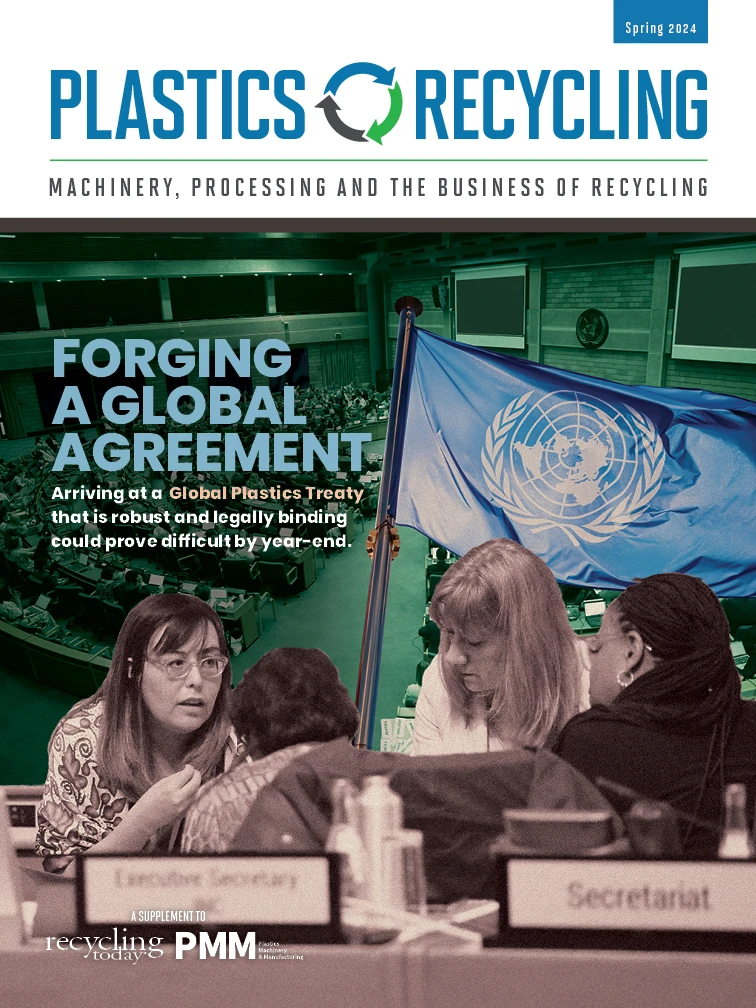The Global Plastics Treaty is in serious trouble.
The third of five planned negotiating sessions of the United Nations Intergovernmental Negotiating Committee (INC-3) ended in Nairobi, Kenya, last November without meeting its goals of creating a full draft of the treaty and scheduling a robust round of working sessions before the fourth meeting in Ottawa this April.
Environmental groups claim some oil-producing countries and industry groups are using stalling tactics to try to water down the treaty. Graham Forbes, head of Greenpeace’s delegation at INC-3, was even more blunt when he said the negotiations are “charging towards catastrophe.”
Plastic pollution is one of the most vexing environmental problems of our time and will get worse without worldwide efforts to clean it up.
It was easy for the 1,900 delegates from 161 countries and lobbyists representing 143 chemical and fossil fuel companies who showed up for the first negotiating session in Uruguay to agree action is needed. Optimistic reports from INC-1 and INC-2 in Paris indicated it might be possible to write a binding, worldwide treaty that would end plastic pollution by 2040.
Things started to change in Nairobi. A coalition of countries led by Canada, Rwanda and Norway, along with 17 other members, want the treaty to reduce production of plastics to what they call “sustainable levels.”
But some oil-producing countries are having second thoughts and at INC-3 argued for shifting previously agreed-upon mandates like focusing on global waste management to, instead, adopting voluntary national measures.
Both sides of the argument have support. “We feel the agreement should really focus on ending plastic pollution and not plastic production,” said Isabelle Des Chênes, executive vice president of the Chemistry Industry Association of Canada.
According to a report from The Canadian Press, a scientific paper co-authored by Miriam Diamond, a professor of earth science at the University of Toronto, could get considerable discussion in Ottawa. Diamond argues spending on waste management while production increases won’t solve the problem.
The WWF argues the treaty must address plastic pollution across the entire life cycle of plastics and trying to refocus it to only waste management prioritizes short-term benefits and profits over the health of people and the planet.
Progress on a draft treaty made during the first two sessions ended in the third session as countries proposed hundreds of changes and additions. Critical work between sessions three and four did not get scheduled.
What does all this mean for plastics recyclers and the greater plastics industry? We should have a clearer picture after INC-4 in April. Will plastic products identified as “problematic” be eliminated? Will new product design rules appear? Will extended producer responsibility become the law of the land?
Watch for reports from the Ottawa meeting. They could portend changes to your business. Or maybe not.

Explore the Spring 2024 Plastics Recycling Issue
Check out more from this issue and find your next story to read.
Latest from Recycling Today
- BMW Group, Encory launch 'direct recycling’ of batteries
- Loom Carbon, RTI International partner to scale textile recycling technology
- Goodwill Industries of West Michigan, American Glass Mosaics partner to divert glass from landfill
- CARI forms federal advocacy partnership
- Monthly packaging papers shipments down in November
- STEEL Act aims to enhance trade enforcement to prevent dumping of steel in the US
- San Francisco schools introduce compostable lunch trays
- Aduro graduates from Shell GameChanger program





